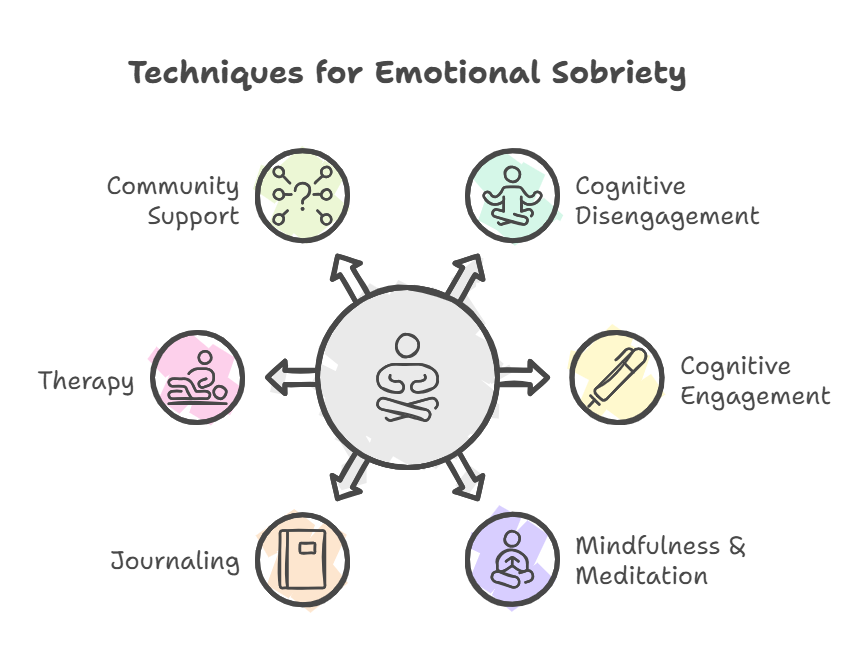You’ve achieved sobriety. But something feels off. You’re physically sober, but your emotions feel like a rollercoaster.
This could be the missing piece: emotional sobriety. It’s more than just not using. It’s about finding inner peace and stability. It’s about developing emotional sobriety.
Understanding Emotional Sobriety
How can we define emotional sobriety? Emotional sobriety involves understanding and managing your feelings. It means to recognize and process both good and bad emotions. But, do not let them control you. For many, it’s a journey of self-discovery and personal growth.
The Importance of Emotional Regulation
If you’ve had addiction issues, you know that bad feelings can trigger cravings. Learning healthy coping strategies is essential in emotional sobriety.
These skills help you face life’s challenges without falling back on old habits. Research suggests that people with robust support groups fare better in recovery1.
Building this support can include family therapy and individual therapy sessions. Talking to supportive family members and joining Narcotics Anonymous are also helpful steps. These activities can also promote better mental health outcomes.
“Emotional sobriety is not about avoiding emotions, but learning how to process and respond to them constructively.”
Dr. John Gottman
In the United States, there’s help at treatment center2 in every state. You can gain freedom from addictive substances as you become emotionally sober.
Achieving Emotional Sobriety
How can one cultivate emotional sobriety? It is often an ongoing process of building self-awareness. It also includes practicing effective strategies. Many treatment programs use cognitive engagement as part of addiction recovery and the path to emotional sobriety.
Key Techniques for Emotional Sobriety
A valuable strategy for managing your emotions is distraction, a form of cognitive disengagement. If feeling overwhelmed, engaging in another activity can offer relief.
There are treatment programs that offer dual diagnosis3 options to help prevent relapse while dealing with underlying issues like chronic pain. Consider these key techniques in achieving emotional sobriety. There are additional factors such as mindfulness, therapy and other things.
For additional guidance on letting go of emotional burdens, check out our article on emotional baggage: top tips for healing.

- Cognitive Disengagement: If thoughts of alcohol or drugs overwhelm you, try exercising. It can help. Engaging in another activity may provide immediate relief from cravings and intrusive thoughts.
- Cognitive Engagement: This means actively reflecting, interpreting, and adjusting your thoughts. It helps prevent relapse and treats emotional addiction. It may lead to a long-term re-evaluation of the causes of addiction.
- Mindfulness & Meditation: Mindfulness meditation can help you stay present. It can stop you from fixating on anxieties. Staying grounded in the present, reducing cravings, and fostering emotional stability.
- Journaling: Journaling helps you understand triggers, emotional patterns. It gives you a safe space for self-expression. It can help you gain clarity of what you process emotional so you can heal faster.
- Therapy: Individual and group sessions provide expert guidance. They help you navigate complex emotions. You may work through unresolved trauma, including those from childhood trauma. It helps you manage emotions better.
- Community Support (12-step programs): It’s vital for preventing relapse and promoting emotional sobriety. Programs like Alcoholics Anonymous and Narcotics Anonymous can reduce feelings of isolation. You may discover practical coping strategies for sustaining long-term emotional sobriety and happiness.
Studies highlight the power of mindfulness to lessen the intensity of cravings. Mindfulness encourages stability in your emotions. Research also demonstrates that mindfulness may improve emotional regulation. A good program would incorporate these elements.
| Technique | Benefit |
|---|---|
| Cognitive Disengagement (Distraction) | Immediate relief from cravings and intrusive thoughts in early recovery. |
| Cognitive Engagement | Long-term re-evaluation of triggers and underlying issues contributing to addiction. |
| Mindfulness & Meditation | Staying grounded in the present, reducing cravings, and fostering emotional stability. |
| Journaling | Understanding triggers, emotional patterns, and providing a safe space for self-expression. |
| Therapy (Individual & Group) | Professional guidance in navigating and managing emotional triggers. Working through unresolved trauma. Developing healthier emotional regulation patterns. |
| Community Support (12-step programs) | Shared experiences, reduced feelings of isolation, and practical coping strategies to foster sustained sobriety. |
Acknowledging and Accepting Your Emotions
Emotional sobriety starts with accepting that you can’t be positive all the time. Emotions, even negative ones, help you understand yourself. Avoiding or suppressing negative emotions often backfires.
For family members affected by addiction, resources are available. Programs like NACoA (National Association for Children of Alcoholics)4 might help. They could support children and adolescents. This support helps those affected by a family member’s substance abuse. It also addresses its impact on family health care.
The Long-Term Benefits of Emotional Sobriety
This lifelong project is no cakewalk. As you grow and learn to regulate negative feelings, you’ll feel different. Sobriety isn’t just about trying to “not drink.”
Emotional sobriety involves looking deeper within yourself for long-term recovery success.
Sustaining Long-Term Emotional Sobriety and Happiness
True partnerships in sobriety go further than traditional forms of engagement. Finding deeper, unlabeled connections helps people in recovery stay happy.
Building these deeper relationships requires work and healthy communication. People learn these things when seeking emotional sobriety in a treatment program5.
Bill W., co-founder of Alcoholics Anonymous, emphasizes “a quiet place in bright sunshine.” Many A.A. members who sustain sobriety experience true peace of mind.
They feel this even while acknowledging all their feelings. They often live by the principles of the fellowship in every aspect of life. This builds deeper personal connections without expectations for reciprocity. In turn, this leaves them feeling empowered and supported.
Frequently Asked Questions
What does it mean to be emotionally sober?
Keys to emotional sobriety are: self-awareness, acceptance, and a supportive community. It’s also important to learn coping skills. Mindfulness, therapy, and support groups can help strengthen your mental outlook. The combination of therapies and support group engagement can greatly help. These resources can help you better avoid and manage triggers. It’s never too late to seek emotional sobriety. Support groups can help. The Traveler, published by Alcoholics Anonymous World Services, offers valuable articles.
What are the keys to emotional sobriety?
Keys to emotional sobriety include self-awareness, acceptance of all your emotions, and building a supportive community. It’s also important to learn coping skills. Mindfulness, therapy, and support groups can help strengthen your mental outlook. The combination of therapies and support group engagement can greatly help.
These resources can help you better avoid and manage triggers. It’s never too late to seek emotional sobriety through the available support and groups. The Traveler, published by Alcoholics Anonymous World Services, offers valuable articles.
What is emotional sobriety in As Bill sees it?
In Bill W.’s view, emotional sobriety is likened to “a quiet place in bright sunshine.” This is a calm from using AA’s principles daily. It brings peace amid life’s ups and downs. His 1958 essay “Emotional Sobriety: The Next Frontier” discusses its key role in addiction recovery. His own journey and those within his fellowships demonstrated lasting benefits. Those who followed these ideas gained much. They maintained long-term emotional sobriety and health.
How long does sobriety fatigue last?
There’s no set timeframe for sobriety fatigue. It can vary from person to person depending on various factors. Factors include stress, sobriety, support, and underlying conditions. If you continue struggling to manage emotions, consider getting professional guidance. You can gain more strategies for how to manage your feelings. For those who relapse, it’s vital to seek support. This helps them avoid unhealthy habits, like their old, addictive use of alcohol. Professional therapy programs can provide a foundation for building lasting recovery. Some programs combine therapies for individuals and their families. They help them maintain emotional sobriety after addiction. They may help family members support their loved one seeking emotional sobriety. Treatment programs, such as at a recovery center, vary and may be suited for individual needs.
Conclusion
Emotional sobriety is a transformative journey, not a quick fix, and it offers far more than just relapse prevention. It is a deeply personal process, requiring continuous effort and the integration of various practices that support both mental and emotional well-being.
Those committed to emotional sobriety often experience profound changes in their lives. They form deeper and more meaningful connections with others, rooted in authenticity and trust. Many discover a greater sense of gratitude, learning to appreciate both the joys and challenges of life.
By embracing their true feelings, rather than avoiding or suppressing them, they develop a more positive and resilient outlook.
Emotional sobriety empowers individuals to navigate life’s ups and downs with clarity and inner peace, fostering a sense of fulfillment that comes from living in alignment with their values and emotions.
Small Step, Big Impact
Begin your emotional sobriety journey today by practicing mindfulness for 10 minutes a day. Notice how your emotional reactions shift, and take note of what you feel.
Listen to this article
This is an AI generated Podcast version of the article.



